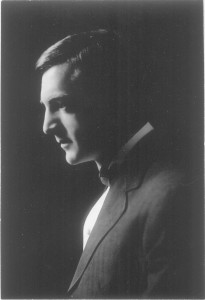 My grandfather’s intense devotion to place and history and the recording of both manifested itself in his writing and his photography, as well as his civic duties. His folksy stories of the Lower Cape Fear have long been available and were recently reprinted due to popular demand. This album is an overdue compendium of his groundbreaking photographic work, parts of which are already embedded in Wilmingtonians’ psyche by their constant reference in the press, promotions, and in historical and photographic anthems.
My grandfather’s intense devotion to place and history and the recording of both manifested itself in his writing and his photography, as well as his civic duties. His folksy stories of the Lower Cape Fear have long been available and were recently reprinted due to popular demand. This album is an overdue compendium of his groundbreaking photographic work, parts of which are already embedded in Wilmingtonians’ psyche by their constant reference in the press, promotions, and in historical and photographic anthems.
Only a visionary such as Mr. Moore would have realized that even in the depth of The Depression, the recording of “Old Wilmington” would be of lasting value to succeeding generations such as that which has now engulfed the Greater Wilmington area. It seems ironic that whilst celebrated author and fellow North Carolinian Thomas Wolfe was writing You Can’t Go Home Again in the late 1930s, his contemporary Mr. Moore was simultaneously preoccupied with ensuring that the same very home would be preserved and recorded for old Wilmingtonians to still enjoy today, regardless of whether they ever left home.
Although my memories are dim of my namesake, as a little boy I do remember his tapping away at his manual typewriter amid a warren’s nest of saved periodicals that gathered the southern dust as they piled so high in his study as to block out the strong summer sun, tuned into whatever baseball game the radio was blaring. He was in his element: recording, protecting, and invigorating the environment and its history while connecting with the larger world around him through baseball. And then later, the tapping over, I would tiptoe into his private lair as he snored, still sitting at the typewriter, taking cat’s nap rest from whatever civic battle he may have currently been waging for preservation’s purpose.
His ingrained passion was inspired by his own family legacy: his father, Col. Roger Moore, staved off a lynching mob at the city jailhouse during Wilmington’s Race Riot of 1898. With equal tenacity, his colonial ancestor, “KIng” Roger Moore, carved out the famous Orton Plantation from the mud banks of the Cape Fear River, and fought marauding Indians and faced off potential usurpers such as William Teach “Blackbeard.” Likewise, Louis T Moore saw himself as a “warrior” for the Cape Fear area, its long-range protector against shortsighted pursuits and commercial interests. He, with a small handful of like-minded civic citizens, was largely responsible for battling the attempts at eradicating a place as beautiful as what is now known as “Old Wilmington.”
Of course there were lost battles of homes he was not able to save from destruction, stately galleons of a bygone age, as remembered by several of his photographs. Other handsome antebellum and post-bellum structures remain, some of them saved by his efforts. I like to think that his passions and preoccupations laid the foundation for the organized preservation movement he would not live to see.
It is fitting and just that the photographic chronicles of one of Cape Fear’s ardent preservationists have been themselves preserved and now published. This volume represents author Susan Taylor Block’s exhaustive efforts to illuminate Mr. Moore’s photographs and define his life’s work. The creation of Wilmington Through the Lens of Louis T. Moore was made possible by the careful attention and preservation given to my grandfather’s photographs by the New Hanover County Public Library, particularly Beverly Tetterton, Special Collections Librarian for almost thirty years. Other guardians of my grandfather’s legacy include the Historical Society of the Lower Cape Fear, Leslie N. Boney, Jr., Ann Hewlett Hutteman, Constance and Walter Knox, Diane Cobb Cashman, J. Laurence Sprunt, E. Lawrence Lee, and Katherine Howell. Their efforts are greatly appreciated.
For my part, my grandfather imbued me, either by his example or through his genes, with the valued importance of roots and history, the spirituality of protecting the environment, and the timelessness of historical preservation. I am proud to carry his name and to have the opportunity to perpetuate his mission.
Louis Moore Bacon
